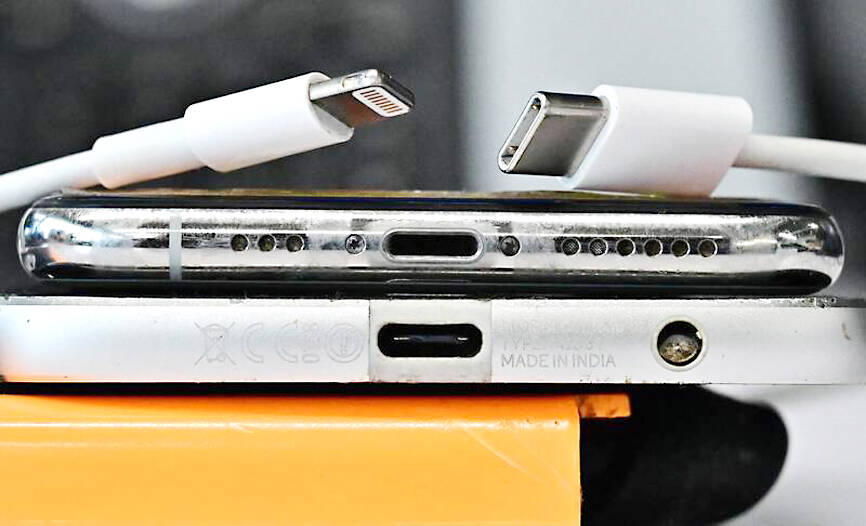The National Communications Commission’s (NCC) is to follow the EU’s lead on making charging via USB-C port mandatory for all new phones, to ensure consumers’ convenience and electronic waste reduction, the agency’s annual legislative plan shows.
The EU lawmakers last year voted to adopt a directive to make the USB-C port for wired charging mandatory on all future smartphones sold in the bloc, including new iPhones, effective from Dec. 28 next year.
The NCC has previewed its legislation plan and inventory of regulations, including the planned amendment to the Technical Specifications for Mobile Telecommunications Terminal Equipment (行動通信終端設備技術規範), in accordance with the EU’s newly adopted directive.

Photo: AFP
The amendment is expected to be proposed in June next year and promulgated in December next year.
NCC Department of Infrastructure section head Hsieh Chih-chang (謝志昌) yesterday said that as the EU is to implement the new directive regarding the use of USB-C port from Dec. 28 next year, the NCC would follow the EU’s lead to be in line with the international standards and all telecommunication terminal equipment in Taiwan would be required to pass the council’s examination.
Having a universal charging port has two advantages: the convenience of the consumers and reducing electronic waste, Hsieh said.
The NCC’s telecommunication terminal equipment examinations has three levels: telecom interface, electromagnetic compatibility and electrical safety, Hsieh said, adding that bad quality cables could pose a fire hazard, and the commission evaluates such risks as well.
The existing regulations allow chargers to have USB-A or USB-C ports and smartphones to have micro USB, USB-C or Lightning ports, he said, adding that with the planned amendments, only phones with a USB-C port would be approved.
Lightning ports were previously used on iPhones, and micro USB is an old technology that is not used as often as in the past, Hsieh said.
As the sale of products that previously got NCC approval is to be allowed, people do not need to worry about changing their phones or chargers, he said.
The EU regulations are to apply to laptops too, but 16 months later than phones, Hsieh said, adding that the Ministry of Economic Affairs is to decide whether Taiwan would regulate laptop chargers.

Taiwan is stepping up plans to create self-sufficient supply chains for combat drones and increase foreign orders from the US to counter China’s numerical superiority, a defense official said on Saturday. Commenting on condition of anonymity, the official said the nation’s armed forces are in agreement with US Admiral Samuel Paparo’s assessment that Taiwan’s military must be prepared to turn the nation’s waters into a “hellscape” for the Chinese People’s Liberation Army (PLA). Paparo, the commander of the US Indo-Pacific Command, reiterated the concept during a Congressional hearing in Washington on Wednesday. He first coined the term in a security conference last

Prosecutors today declined to say who was questioned regarding alleged forgery on petitions to recall Democratic Progressive Party (DPP) legislators, after Chinese-language media earlier reported that members of the Chinese Nationalist Party (KMT) Youth League were brought in for questioning. The Ministry of Justice Investigation Bureau confirmed that two people had been questioned, but did not disclose any further information about the ongoing investigation. KMT Youth League members Lee Hsiao-liang (李孝亮) and Liu Szu-yin (劉思吟) — who are leading the effort to recall DPP caucus chief executive Rosalia Wu (吳思瑤) and Legislator Wu Pei-yi (吳沛憶) — both posted on Facebook saying: “I

The Ministry of Economic Affairs has fined Taobao NT$1.2 million (US$36,912) for advertisements that exceed its approved business scope, requiring the Chinese e-commerce platform to make corrections in the first half of this year or its license may be revoked. Lawmakers have called for stricter enforcement of Chinese e-commerce platforms and measures to prevent China from laundering its goods through Taiwan in response to US President Donald Trump’s heavy tariffs on China. The Legislative Yuan’s Finance Committee met today to discuss policies to prevent China from dumping goods in Taiwan, inviting government agencies to report. Democratic Progressive Party Legislator Kuo Kuo-wen (郭國文) said

The Ministry of Economic Affairs has fined Taobao NT$1.2 million (US$36,900) for advertisements that exceeded its approved business scope and ordered the Chinese e-commerce platform to make corrections in the first half of this year or its license would be revoked. Lawmakers have called for stricter supervision of Chinese e-commerce platforms and more stringent measures to prevent China from laundering its goods through Taiwan as US President Donald Trump’s administration cracks down on origin laundering. The legislature’s Finance Committee yesterday met to discuss policies to prevent China from dumping goods in Taiwan, inviting government agencies to report on the matter. Democratic Progressive Party